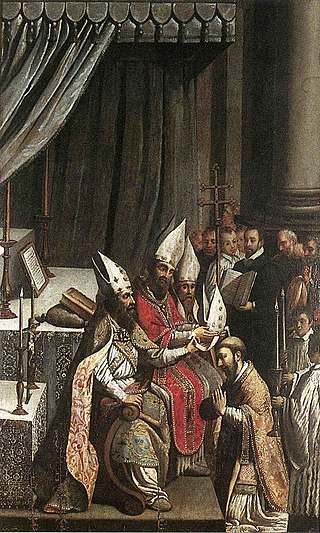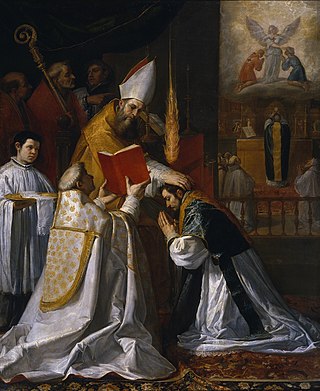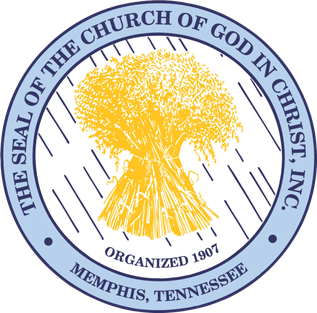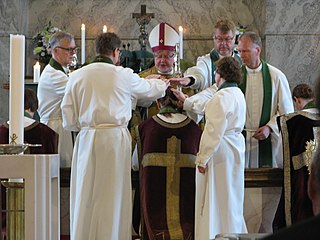
Apostolic succession is the method whereby the ministry of the Christian Church is considered by some Christian denominations to be derived from the apostles by a continuous succession, which has usually been associated with a claim that the succession is through a series of bishops. Those of the Anglican, Church of the East, Eastern Orthodox, Hussite, Moravian, Old Catholic, Oriental Orthodox, Catholic and Scandinavian Lutheran traditions maintain that "a bishop cannot have regular or valid orders unless he has been consecrated in this apostolic succession". These traditions do not always consider the episcopal consecrations of all of the other traditions as valid.
A bishop is an ordained member of the clergy who is entrusted with a position of authority and oversight in a religious institution. In Christianity, bishops are normally responsible for the governance and administration of dioceses. The role or office of the bishop is called episcopacy. Organizationally, several Christian denominations utilize ecclesiastical structures that call for the position of bishops, while other denominations have dispensed with this office, seeing it as a symbol of power. Bishops have also exercised political authority within their dioceses.

An episcopal polity is a hierarchical form of church governance in which the chief local authorities are called bishops. The word "bishop" here is derived via the British Latin and Vulgar Latin term *ebiscopus/*biscopus, from the Ancient Greek ἐπίσκοπος epískopos meaning "overseer". It is the structure used by many of the major Christian Churches and denominations, such as the Catholic, Eastern Orthodox, Oriental Orthodox, Church of the East, Anglican, Lutheran and Methodist churches or denominations, and other churches founded independently from these lineages.

In certain Christian denominations, holy orders are the ordained ministries of bishop, priest (presbyter), and deacon, and the sacrament or rite by which candidates are ordained to those orders. Churches recognizing these orders include the Catholic Church, the Eastern Orthodox, Oriental Orthodox, Anglican, Assyrian, Old Catholic, Independent Catholic and some Lutheran churches. Except for Lutherans and some Anglicans, these churches regard ordination as a sacrament.
A pastor is the leader of a Christian congregation who also gives advice and counsel to people from the community or congregation. In Lutheranism, Catholicism, Eastern Orthodoxy, Oriental Orthodoxy and Anglicanism, pastors are always ordained. In Methodism, pastors may be either licensed or ordained.

The Church of God in Christ (COGIC) is an international Holiness–Pentecostal Christian denomination, and the largest Pentecostal denomination in the United States. Although an international and multi-ethnic religious organization, it has a predominantly African American membership based within the United States. The international headquarters is in Memphis, Tennessee. The current Presiding Bishop is Bishop John Drew Sheard Sr., who is the Senior Pastor of the Greater Emmanuel Institutional Church of God in Christ of Detroit, Michigan. He was elected as the denomination's leader on March 27, 2021.
The Church of God is a holiness Pentecostal body that descends from the Christian Union movement of Richard Spurling, A. J. Tomlinson and others. They consider themselves officially The Church of God, but also designate themselves as The Church of God (1957 Reformation) and The Church of God (Jerusalem Acres), which is the name of their headquarters.

The Church of Our Lord Jesus Christ of the Apostolic Faith is a Oneness Pentecostal church with headquarters in Manhattan. It was founded in 1919 by Robert C. Lawson.
The Apostolic Assemblies of Christ, Inc., Incorporated (AAofC), is a Christian Church in the Oneness Pentecostal tradition. The Church is episcopal in governance. The Apostolic Assemblies of Christ was founded as an ecclesiastical corporation under the statutes of the non-profit corporation laws of the United States. The purpose of the founding of the corporation was to provide an ecclesiastical body where all churches could feel free to worship God and where all churches would have representations on all levels. The founder and presiding bishop (emeritus) G. M. Boone started with 7 churches and currently there are 259 churches worldwide. From the beginning, the Apostolic Assemblies of Christ had a set goal and purpose to its very existence in order to exalt the name of Jesus Christ. The organization's headquarters is located in Detroit, Michigan.

Mother church or matrice is a term depicting the Christian Church as a mother in her functions of nourishing and protecting the believer. It may also refer to the primary church of a Christian denomination or diocese, i.e. a cathedral or a metropolitan church. For a particular individual, one's mother church is the church in which one received the sacrament of baptism. The term has specific meanings within different Christian traditions. Catholics refer to the Catholic Church as "Holy Mother Church".

The Church of South India (CSI) is a united Protestant Church in India. It is the result of union of a number of Protestant denominations in South India that occurred after the independence of India.
A presiding bishop is an ecclesiastical position in some denominations of Christianity.

The Apostolic Church is an international Christian denomination and Pentecostal movement that emerged from the Welsh Revival of 1904–1905. Although the movement began in the United Kingdom, the largest national Apostolic Church became the Apostolic Church Nigeria. The term "Apostolic" refers to the role of apostles in the denomination's church government, as well as a desire to emulate 1st century Christianity in its faith, practices, and government.

The priesthood is the office of the ministers of religion, who have been commissioned ("ordained") with the Holy orders of the Catholic Church. Technically, bishops are a priestly order as well; however, in layman's terms priest refers only to presbyters and pastors. The church's doctrine also sometimes refers to all baptised (lay) members as the "common priesthood", which can be confused with the ministerial priesthood of the consecrated clergy.

In the Catholic Church, a bishop is an ordained minister who holds the fullness of the sacrament of holy orders and is responsible for teaching doctrine, governing Catholics in his jurisdiction, sanctifying the world and representing the Church. Catholics trace the origins of the office of bishop to the apostles, who it is believed were endowed with a special charism and office by the Holy Spirit at Pentecost. Catholics believe this special charism and office has been transmitted through an unbroken succession of bishops by the laying on of hands in the sacrament of holy orders.
In Christianity, an elder is a person who is valued for wisdom and holds a position of responsibility and authority in a Christian group. In some Christian traditions an elder is an ordained person who serves a local church or churches and who has been ordained to a ministry of word, sacrament and order, filling the preaching and pastoral offices. In other Christian traditions, an elder may be a lay person serving as an administrator in a local congregation, or be ordained and serving in preaching or pastoral roles. There is a distinction between ordained elders and lay elders. The two concepts may be conflated in everyday conversation. In non-Christian world cultures the term elder refers to age and experience, and the Christian sense of elder is partly related to this.

Jesse Delano Ellis, II, commonly known as J. Delano Ellis, was an American Protestant religious leader and progenitor of unity among African American Pentecostals with Trinitarian and nontrinitarian affinities.
Robert Clarence Lawson was an early-20th-century American clergyman, best known for founding the Refuge Church of Christ, a predecessor of the Church of Our Lord Jesus Christ.
Steven Allen Breedlove is an American prelate of the Anglican Church in North America. He was elected as the first Presider Bishop of PEARUSA, a missionary district that was formerly part of the Anglican Church of Rwanda, in 2012. In 2016, Breedlove became the first diocesan bishop of the Anglican Diocese of Christ Our Hope.

In Christianity, the laying on of hands is both a symbolic and formal method of invoking the Holy Spirit primarily during baptisms and confirmations, healing services, blessings, and ordination of priests, ministers, elders, deacons, and other church officers, along with a variety of other church sacraments and holy ceremonies.











